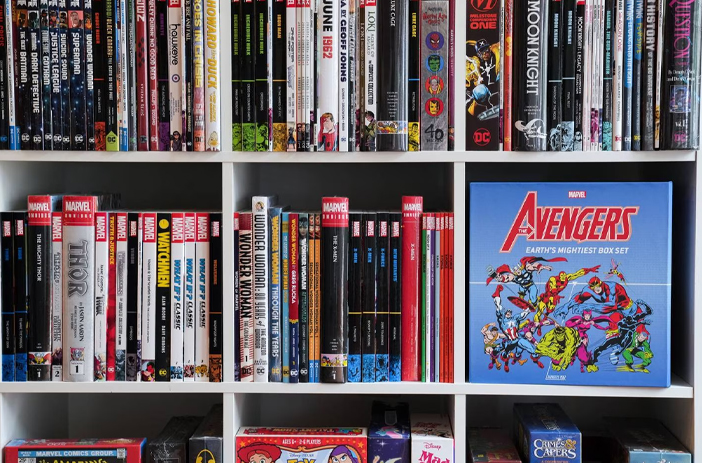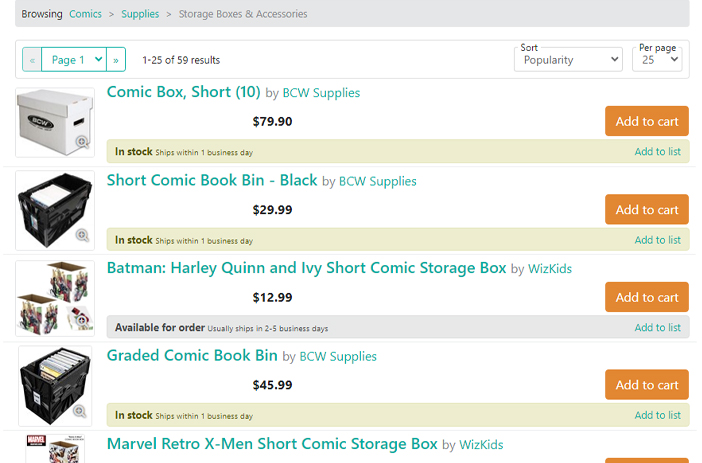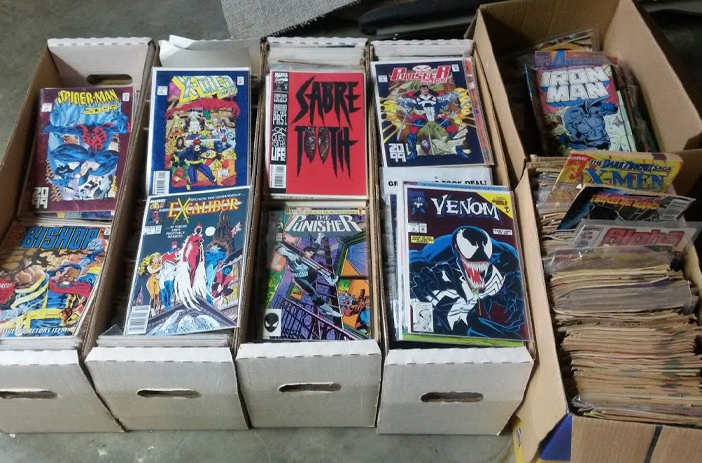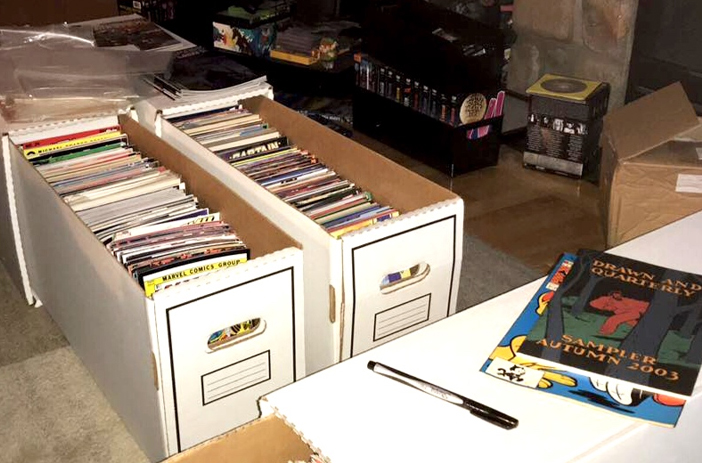
Some people get into collecting comics as an investment, or they only collect prestige issues, keys and rarities, and the like. These people generally can count their comics on just a few hands, know what they have, and can keep it all easily in mind.
Other people have subscriptions to comics, buy bulk boxes, or go through thousands of issues every month with buying and selling. It's impossible to keep everything in mind, even when all you're thinking about is publisher, serialization, issue number, and so on. That doesn't even get into variants, conditions, prices, and more.
When you reach a point where you have more comics than you can keep easily in mind, it's worth investing in a system for sorting, cataloging, and indexing your collection. That way, you know what you have (and, if necessary, where it is) without having to dig through piles.
The question is, how can you sort and organize your comics? There are a bunch of different options and schools of thought, so let's talk about it.
Table of Contents
Decide on a Storage Solution
Before you can decide how to index a collection, you need to know how you're going to store it. Maybe you already have a storage solution that works, and you just need better sorting or an independent list of your comics, and that's fine. But if all you have is piles on a bookshelf or a bunch of loose comics, you'll probably want to invest in something a little more serious.

Image source: https://www.thebaltimorebanner.com/culture/things-to-do/four-local-comic-book-shops-to-visit-and-become-a-true-believer-QXZQ4RQGJJBNTMQXYOI3AXVSGA/
First of all, to safely store comics of low to moderate value, you need bags and boards. Cardboard boards and plastic bags help protect your comics and prevent them from rubbing against one another, sliding around, getting creased, or slouching. Luckily, bags and boards are cheap and easy to acquire, so you should always have some on hand.
Of course, a bunch of slippery plastic bags aren't great on their own, so you should also have storage boxes. Comic storage boxes are cardboard boxes built to hold comics with just a little room to breathe, but not so much that they can be damaged when properly handled. Shortboxes hold around 150-200 comics, while longboxes hold 200-250 comics (thicker comics take up more space, obviously.) Make sure you have plenty of boxes for your storage system or be prepared to buy a few more as necessary.

Note: You can also get plastic boxes, as well as larger storage systems with shelves and drawers, but this is often overkill (and more expensive) for anything less than a comic shop.
If you're feeling fancy, you can also get branded or decorated storage boxes to indicate what's in them. An X-men box to hold all your X-men comics, for example. These are more expensive, though, and if you get too many comics for the one box to hold, then what?
Decide on an Organization System
Next up, you have to decide how you want to sort your comics. In part, this can depend on how broad your collection is. If you're just a Superman Super-Fan, you don't need to worry about divisions by publisher or character, just by series. If you collect all things Marvel, you can have different sections for different Marvel lines, but you don't really need to care about the division between publishers. If your collection is extremely broad, you'll be more likely to want a top-level sort based on publisher and go down from there.
Some tips, in no particular order.
- You may want to separate different "types" of comics, like standard issues from omnibus issues from trade paperbacks and prestige hardcovers, the latter two of which can sit on a bookshelf rather than in boxes a lot more easily.
- Sort your categories. Alphabetical order is extremely useful for subcategories, like the different series' within a given line.
- Consider if you want to keep meta-arcs together. For example, the "Blackest Night" saga in Green Lantern encompassed issues of Green Lantern, Green Lantern Corps, Solomon Grundy, Titans, and a whole range of arc-specific miniseries' like Blackest Night: JLA and Untold Tales of Blackest Night. You can sort all of these under their own lines and series, or you can keep the overall arc together in one bundle.
- If you have special, valuable comics you want to keep out of the rank and file of dollar-bin issues, consider using an insert in the longbox where the key would be, just to have a physical indicator that you have the comic; it's just elsewhere. You don't need to do this, but it can be helpful for very large collections.
Some people like to sort by author or artist. This is fine if you're a dedicated fan of that author or artist and like to keep their work on hand, but most of the time, it's an ineffective sorting system. We don't recommend it.

Image source: https://i.ytimg.com/vi/aTPyjT1z7lY/maxresdefault.jpg
Another option is to sort by character. This is fine for single-character runs, whether it's Superman or Batman or Kraven the Hunter, but then you run into problems. An issue where Spider-Man fights Kraven could go under the Spider-Man category or the Kraven category, so which do you pick? What about teams? Does every Iron Man and Captain America comic go in the Avengers category?
Usually, the easiest option is something like this:
- Publisher, if relevant.
- Series within publisher. Green Lantern, Superman, Justice League, etc. Keep different lines separate; Justice League, JLA, Justice League International, and so on.
- Date for series. Older Justice League series' before newer Justice Leagues.
- Issue Number within series. Obviously, issue #5 comes before issue #7, with issue #6 between them.
- Alphabetically at each step of the way. Avengers before X-Men, with Spider-Man in between.
There's a lot of room for simple variation here, so pick something that jives with your mode of thinking and use it. The best cataloging system is the one that you find intuitive and can maintain.
Label everything! Make sure your boxes are appropriately labeled, and use inserts between comics to note divides between groups, series, and other transitions. We recommend using non-permanent labels; glue a bag to the front of the box and put an insert in it describing what's inside, or something similar. Taking a Sharpie to the box just means it gets messy over time as you need to shuffle comics around and reorganize for space.
Once you know more or less how you want to sort your comics, it's time to actually get to work.
Sort in Phases
Now that you know how you're going to sort your comics, it's time to sit down and get to it. Depending on how many comics you have and how elaborate your system is, you'll probably need to sort in phases.
The easy thing to do is pick a category, go through your comics, and separate out that category. For example, if you have a wide range of comics, you might make piles for Marvel, DC, Image, and Others. When you're done with that initial sort, you can then go back to the Marvel pile and sort them to the next stage, or even completely, if you have the space for it.

Image source: https://cahsseffect.org/faculty/comics-are-for-everyone-five-things-you-need-to-know-about-the-worlds-best-art-form/
This is also where you turn theoretical questions into practical answers. Is "Amazing Spider-Man" under A while "Spider-Man" is under S, or are they both under S for Spider-Man? Do you file all X-Men comics under X, even Uncanny X-Men? Make a choice and keep it consistent.
You may also want to decide whether you want to tackle the biggest groups first or the smallest. Some people like going for the biggest first (like everything Superman) so they can make a tangible dent in a huge collection. Others start with smaller sorts first (like sorting through the Image or Vertigo comics) to get one category done and out of the way for a sense of real progress. It's a bit psychological and up to you.
Record Information as You Go
As you sort, it's a good idea to record information about your comics. Series, Title, and Issue Number are the bare minimum to record, so you have a list of what you have and what you don't. If you want to sell, then you know what you have to research and inventory. If you want to buy, you know what the gaps in your collection are. Having a spreadsheet of the information can also help later when you look for comics worth more than average, or even valuable keys you don't recognize offhand.
Other information you can consider including might be:
- Author and Artist. Some people really value this information, while others don't.
- Condition. Even having a rough idea of whether it's in good condition, moderate condition, or poor condition can help later when you're making use of the information you have.
- Whether or not it's graded. While you're unlikely to be filing your slabs away in longboxes, having the information of whether or not the comics are graded and slabbed – and what the grade is – helps to have on hand.
- Inclusions. Some comics have coupons, posters, and other inserts that can be important. Noting whether or not you have them can be useful information.
- Variants. Comics with different variant covers, newsstand versus mailer variants, and other details can be important for certain eras of comics.
- Additional details. Is the comic signed? It might be worth noting down. Signatures that aren't verified might not be worth a premium, but it's still good to know if there's extraneous ink on the covers, good or bad.
Just make sure not to get too into the weeds with your information tracking. Once your comics are sorted, you can always go back and comb through a longbox for additional information on each book in it, or even just make a quick note of the comics you have by issue and title and only record additional information for valuable books and keys. The more time you spend typing info about the comics, the less time you spend actually sorting them.

Image source: https://images.squarespace-cdn.com/content/v1/5943113ac534a5c1d84bf360/1559693202090-KYGL4GKI1VBJO1X57KM4/60042174_2389783441043693_5888825583621636096_n.jpg?format=1000w
Another potentially relevant detail is whether or not a comic is one you'd like to get graded but haven't yet. Setting these aside is a good idea because you can usually get discounts if you submit several comics for grading at once rather than individually, not to mention saving on shipping.
You can use software and tools to help here. The Comic Book Wiki has a free Excel spreadsheet template you can use if you want to manually fill out the information on your collection. Alternatively, there are a variety of apps out there you can use to fill out the information on a phone or even use image recognition to identify and catalog comics for you using your camera. They can help speed up the process quite a bit.
Cull Comics You Don't Want
Another tip is to set a box or two aside as the "outgoing" box. As you comb through your comics, chances are you're going to find some you just don't care to hang on to. Maybe you've lost interest in the character, maybe the way a storyline concluded left a sour taste in your mouth, and you don't want to read it again, or maybe you've found some comics that are worth enough that you can't resist selling them. An outgoing box is a good place to file them until you're ready to go through the whole process of listing and selling them.
Of course, this doesn't help if you're planning to run a storefront, flip any and all comics you have, and continually buy new ones. If that's the case, a full comic vendor inventory system might be better than a bunch of bespoke spreadsheets.

Finally, you can always just sell your comics in bulk. We're more than happy to take a look at your collection! Just drop us a line with a description and some pictures, and we'll help you decide what you can do with it. There's no obligation and no pressure, so if you just want advice, we can do that too.



